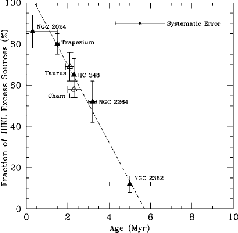



Next: Spectral Energy Distribution (SED)
Up: T Tauri Stars
Previous: T Tauri Stars
Contents
Infrared studies of T Tauri stars in star-forming regions have suggected
that initial disk frequency if rather high and that the disk lifetimes
are relatively short  Myr.
From JHKL photometry, Haish, Lada, & Lada (2001) obtained the fraction
of disk-bearing stars for 6 star formation regions.
L band excess emission indicates an accompanied disk.
The fraction is a decreasing function of age of the cluster as
in Figure 1.6.
This figure shows clearly that the disk fraction is initially very high
(
Myr.
From JHKL photometry, Haish, Lada, & Lada (2001) obtained the fraction
of disk-bearing stars for 6 star formation regions.
L band excess emission indicates an accompanied disk.
The fraction is a decreasing function of age of the cluster as
in Figure 1.6.
This figure shows clearly that the disk fraction is initially very high
(
 ) and rapidly decreases with increasing cluster age.
In 3 Myr a half of the disk stars lose their disks.
Overall disk lifetime is estimated as
) and rapidly decreases with increasing cluster age.
In 3 Myr a half of the disk stars lose their disks.
Overall disk lifetime is estimated as  Myr.
Myr.
Figure 1.6:
Fractions of IR excess sources in respective clusters are
plotted againt the age of the clusters.
 |
Kohji Tomisaka
2007-11-02

